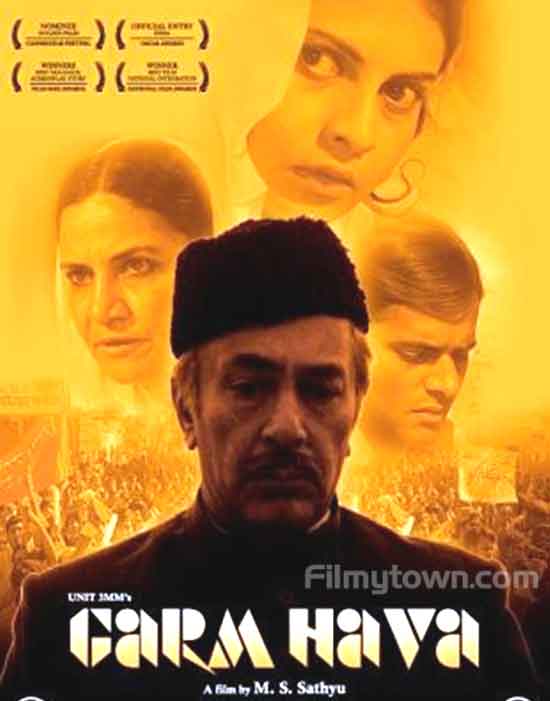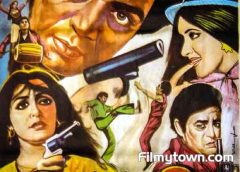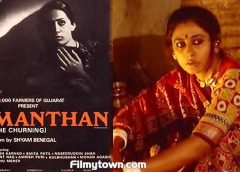One of the most authentic movie on partition and immediate fallout in post partition India, Garm Hava delves into the lives of the minorities who chose to stay back or one’s who migrated overnight without even informing their nearest ones. The struggle and the atmosphere of suspicion and communal strife prevalent at the time is beautifully captured in the film through the eyes and story of a patriarch of a minority family doing business in the North Indian city of Agra.
North India and Uttar Pradesh and surrounding areas in particular were the hub of this dilemma the families faced, to migrate or not. Though depressing in parts the movie ends with a hope for all as the focus changes from the problems of the partition to the problems of survival and earning in the young nation, which has just woken up to the realities of what freedom brings with it, it is time to think ahead and build a nation.
Garm Hava movie was led with a powerhouse performance from the veteran Balraj Sahni, this was also his swansong as he passed away shortly after completing it. It was critically acclaimed as mentioned, was also a forerunner to the parallel or art cinema movement as seen in India, realism with a story to tell. Directed by M.S. Sathyu and written by Kaifi Azmi and Shama Zaidi (Satyu’s wife), the story of Garm Hava was adapted from a short story of Ismat Chhugtai, all known names in, theatre, films and literature at the time are associated in it’s making, it also launched the career of young Farooq Shaikh who was known for light comedies in the years to come. The movie was to be released in the year 1973 but was held up fearing communal backlash as it was seen as a pro minority and anti-India narrative by some and was finally released in a premiere at the Regal Cinema in Bombay in April 1974. The questions raised in the movie still resonated as the answers were still intangible at the time of release.
Garm Hava a story of a well to do Mirza family living in a large haveli, engaged in the shoe manufacturing business in the city of Arga in the then United Province, it starts directly post partition. The family of two brothers the elder Halim who is indulged mainly in political activities and Salim (Balraj Sahni) who is in charge of the family business. Salim’s daughter Amina (Geeta Siddharth) is engaged to Halim’s son Kazim and Salim also has two sons Baqr and Sikander (Farooq Shaikh) a student. Rocked by his brother’s overnight migration to Pakistan Salim still resists migration as he has positive ideas about the way things will progress in the time to come and is aided in his beliefs by his mother who is against it as she wants to die in the house she came as a bride. Facing financial crunch to expand the business as the minorities are seen as risk due to the nature of abrupt migration by many leaving the banks and finance institutions in a quandary, Salim’s business is on the brink as is his daughter’s marriage, to top it the house is in Halim’s name and as he has migrated without transferring it to Salim it is under a threat of being taken over. Salim vacates the Haveli and moves to a smaller rented house which too was difficult to find in a communally charged environment, he also concises the business due to lack of funds and immigration of his elder son to Pakistan, suffering a dent to his reputation. In the meantime as the marriage is now impossible with Kazim, Amina accepts the overtures of her other cousin, unfortunately they too migrate. Thus suffering a double setback Amina commits suicide leaving the family shattered. Sikander is also having problems in getting job and is jibed about being better off in Pakistan. In all this Salim also is investigated for treason though acquitted, he is now cynical due to the voice of dissent around him and plans to migrate too, but Sikander wants to stay on and fight. The climax is the most poignant part, a story of hope, as Salim with family are travelling to the railway station to go to Pakistan a procession of youngsters protesting for equality in jobs and dignity of life pass by urging Sikander to join them, a sudden change of heart Salim encourages his son to join them, sending his wife home in the same carriage, he in fact himself joins the protests thus ending his internal conflict.
Garm Hava is a beautiful tale of human emotions which were the consequence of the biggest migration of humanity in the history of mankind and whose scars reflect to this day, where some migrants still don’t have rights in the country of their residence on both sides and also relations and religious places were separated by a line drawn on the map prohibiting exchange of humanity. We will soon be celebrating 75 years of independence but we need to soul search and answer the question ‘Was it necessary’ could it not have been done in a more civilized manner instead of the bloodshed and the subsequent discrimination and suspicion.
This film Garm Hava is worth its weight in gold is still considered as a masterpiece, it was re-released in 2014 after restoration work on the available prints and the soundtrack. A lesson in history and a must see for audience of all ages and background.
– Revisited by PAWAN GUPTA





